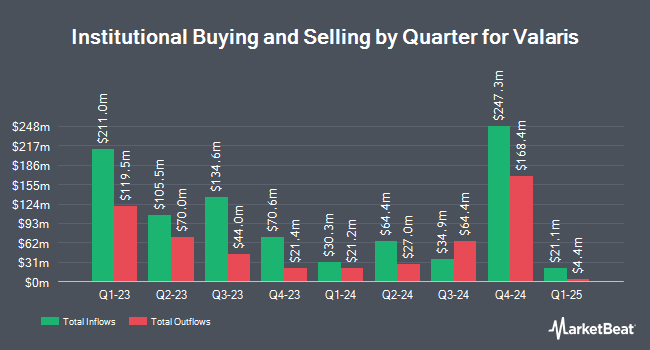SeaCrest Wealth Management LLC trimmed its position in Valaris Limited (NYSE:VAL - Free Report) by 39.7% in the 4th quarter, according to its most recent 13F filing with the Securities and Exchange Commission. The institutional investor owned 9,372 shares of the company's stock after selling 6,173 shares during the quarter. SeaCrest Wealth Management LLC's holdings in Valaris were worth $415,000 at the end of the most recent quarter.
A number of other institutional investors and hedge funds also recently added to or reduced their stakes in the company. Quarry LP bought a new position in shares of Valaris in the third quarter worth about $25,000. Choreo LLC bought a new position in Valaris in the 2nd quarter worth approximately $204,000. Evergreen Capital Management LLC bought a new position in Valaris in the 2nd quarter worth approximately $204,000. Scientech Research LLC purchased a new stake in Valaris during the 2nd quarter valued at approximately $211,000. Finally, SkyView Investment Advisors LLC bought a new stake in shares of Valaris during the second quarter valued at approximately $224,000. Institutional investors own 96.74% of the company's stock.
Analysts Set New Price Targets
VAL has been the subject of a number of research reports. JPMorgan Chase & Co. initiated coverage on shares of Valaris in a research report on Friday, December 6th. They set an "underweight" rating and a $40.00 target price for the company. Susquehanna cut their price objective on Valaris from $61.00 to $55.00 and set a "neutral" rating for the company in a research report on Friday, November 1st. Barclays reiterated an "equal weight" rating and issued a $49.00 target price (down from $59.00) on shares of Valaris in a research report on Wednesday, December 18th. Evercore ISI cut Valaris from an "outperform" rating to an "in-line" rating and cut their price target for the company from $87.00 to $59.00 in a report on Wednesday. Finally, Benchmark cut Valaris from a "buy" rating to a "hold" rating in a report on Tuesday, October 15th. Two investment analysts have rated the stock with a sell rating and six have assigned a hold rating to the company's stock. Based on data from MarketBeat.com, the stock presently has a consensus rating of "Hold" and a consensus price target of $56.67.
View Our Latest Research Report on Valaris
Valaris Trading Down 0.9 %
Shares of NYSE:VAL traded down $0.44 during trading on Friday, hitting $48.05. The company had a trading volume of 1,388,304 shares, compared to its average volume of 1,463,809. The stock has a market cap of $3.42 billion, a price-to-earnings ratio of 3.30 and a beta of 1.10. The company has a debt-to-equity ratio of 0.51, a current ratio of 1.61 and a quick ratio of 1.61. The company has a fifty day simple moving average of $45.48 and a two-hundred day simple moving average of $55.90. Valaris Limited has a one year low of $39.90 and a one year high of $84.20.
Valaris Profile
(
Free Report)
Valaris Limited, together with its subsidiaries, provides offshore contract drilling services Gulf of Mexico, South America, North Sea, the Middle East, Africa, and the Asia Pacific. The company operates through four segments: Floaters, Jackups, ARO, and Other. It owns an offshore drilling rig fleet, which include drillships, dynamically positioned semisubmersible rigs, moored semisubmersible rig, and jackup rigs.
Featured Articles

Before you consider Valaris, you'll want to hear this.
MarketBeat keeps track of Wall Street's top-rated and best performing research analysts and the stocks they recommend to their clients on a daily basis. MarketBeat has identified the five stocks that top analysts are quietly whispering to their clients to buy now before the broader market catches on... and Valaris wasn't on the list.
While Valaris currently has a "Reduce" rating among analysts, top-rated analysts believe these five stocks are better buys.
View The Five Stocks Here
Discover the 10 Best High-Yield Dividend Stocks for 2025 and secure reliable income in uncertain markets. Download the report now to identify top dividend payers and avoid common yield traps.
Get This Free Report
Like this article? Share it with a colleague.
Link copied to clipboard.